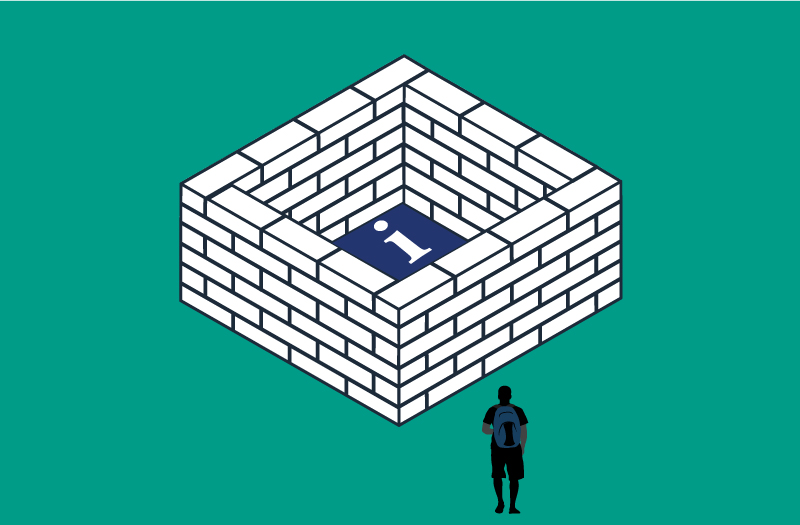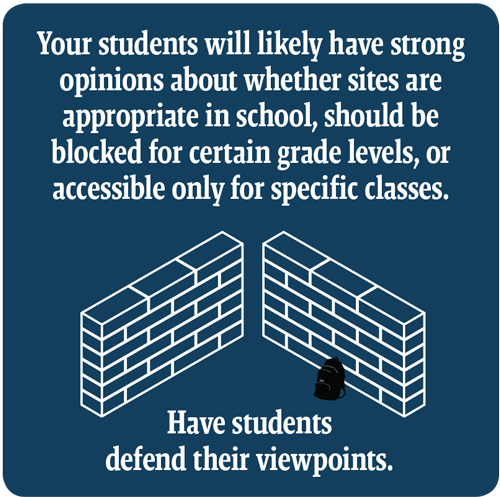Filtering, What Is It Good For?
Try these projects and games with your students on Banned Websites Awareness Day (September 26), which seeks to raise awareness of overly restrictive filtering of educational websites and to explore the impact on intellectual freedom.
 |
iStock and DigitalVision Vectors |
September 26 is the eighth annual Banned Websites Awareness Day (BWAD, pronounced bee-wad), coinciding with Banned Books Week (BBW; September 23–29). Designated by the American Association of School Librarians, BWAD seeks to raise awareness of overly restrictive filtering of educational websites and to explore the impact on intellectual freedom.
While school districts must comply with the Children’s Internet Protection Act (CIPA), many filters reach far beyond the law’s requirements and block so much content that it prevents students from finding relevant material and developing evaluation skills. One of BWAD’s goals is to help students make sound judgments in an environment without filters. Looser filters also empower teachers to better guide their students’ web searches. To meaningfully explore BWAD and help students see the impact of filtering, try these exercises.
First, find ’em!
Challenge your students to find all of the sites that are blocked by your district. Many of my students already know which social media is filtered and can list five or more sites off the bat. A quick search confirms some of their favorite sites like DeviantArt and Wattpad (for fanfiction) are blocked, as are gaming venues including Newgrounds and Game Jolt.
Sort the list into categories and look for themes or patterns. Your students will likely have strong opinions about whether sites are appropriate in school, should be blocked for certain grade levels, or should be accessible only for specific classes. Have students defend their viewpoints. Ask them to design a filter that both meets CIPA requirements and maintains educational access.
Explore impact with a graffiti debate
We post a huge piece of butcher paper in the library, with writer prompts and questions related to web filtering, and encourage students to respond in graffitilike fashion. I collaborated with one social studies teacher to develop the queries, which included “Should websites promoting terrorism be filtered?” and “Should racist sites be filtered?” Students wrote answers throughout the week and often replied to one another. Because much of the feedback centers on First Amendment rights and free speech, those in government classes especially enjoyed participating.
Consider adapting a student survey published by The New York Times in 2011 and 2016 (https://nyti.ms/2i0TqJq). The Times asked: Are web filters in schools still an issue? What websites, blogs, and social networks are blocked in your school? How has this affected teaching and learning for you?

Teach social media research skills
My school allows access to social media sites, including Twitter and Facebook. Our district tech department sees the benefits of students and teachers posting reminders about events, recognition of student success, and help with assignments.
My science teacher and I took the opportunity to demonstrate the need to check authority during Internet research, evaluate evidence, and seek additional resources. The assignment asked students to choose a politicized biology question and find answers using only social media.
Then, we provided two different news or scholarly articles on a topic to teach students how to determine factual accuracy, authorship and authority, and intended audience. Finally, we asked students to find one reliable article and one untrustworthy article from a database, academic journal, or news source. This demonstrated the pitfalls of relying too heavily on a biased or questionable source without evaluating or fact-checking first.
Some districts block all social media and other sites because of disruptive behaviors. Librarians are naturals for teaching appropriate, educational use of web sources, and there are also terrific resources on digital citizenship and cyberbullying at Common Sense Media and Netsmartz.
Address multitasking
Many schools filter social networking and gaming sites because they distract students and present classroom management issues. Digital multitasking can have a negative impact on creativity and concentration, according to a Stanford psychologist (https://n.pr/2N3N0qG). Distractions make it difficult to remember facts and information, and media multitasking can result in a decreased ability to filter out irrelevant information, but students won’t always agree multitasking is a problem.
To demonstrate multitasking’s negative impact, have students write a story they know, such as “The Three Little Pigs,” while counting backward from 200 out loud. After four minutes, ask them the number they were on and where they were in the story. They often struggle with clarity. Next, ask them to write a different story. This time, instruct them to focus on the story first and then the counting, allowing two minutes for each. They find this easier, because they can concentrate on one task at a time.
You can use other examples, such as writing an email while listening to music with lyrics, and bring the conversation back to filtering by asking students how gaming at school would impact their focus and work. Would they remove the distraction by putting away phones? Could they be patient and postpone reading that tweet or Instagram post to focus in class?
Build global censorship awareness
Ask students questions such as “Is having the Internet a basic right?” and “Where would you get information if your Internet was filtered all the time?” Have them identify countries where the Internet is most heavily restricted. Explore the ramifications for the citizens of countries such as Eritrea, North Korea, Vietnam, and China.
Phil Goerner (@pgoerner) is the teacher librarian at Silver Creek High School in Longmont, CO, and an adjunct professor at the University of Colorado at Denver.
RELATED
The job outlook in 2030: Librarians will be in demand
The job outlook in 2030: Librarians will be in demand
ALREADY A SUBSCRIBER? LOG IN
We are currently offering this content for free. Sign up now to activate your personal profile, where you can save articles for future viewing





Add Comment :-
Be the first reader to comment.
Comment Policy:
Comment should not be empty !!!